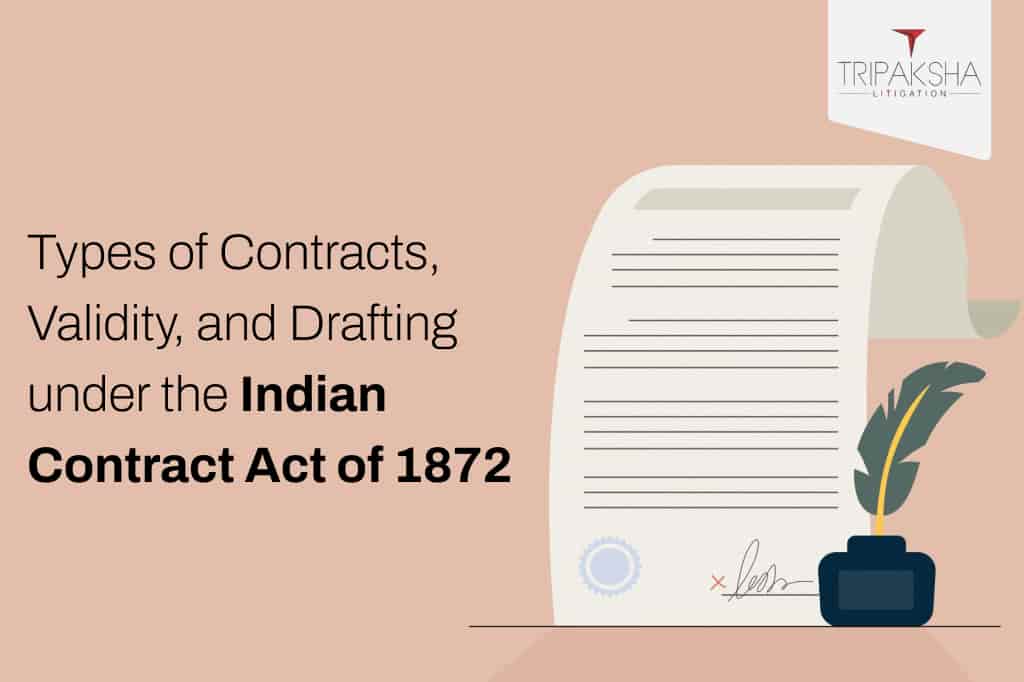Introduction:
The Indian Contract Act, 1872, stands as the cornerstone of contractual law in India, providing a framework for the formation, validity, and enforcement of contracts. In a country bustling with diverse commercial activities, understanding the nuances of this legislation is paramount for businesses, individuals, and legal practitioners alike. This article aims to delve into the Indian Contract Act, exploring its intricacies regarding the types of contracts recognized, the conditions for their validity, and best practices for drafting contracts that withstand legal scrutiny.
Types of Contracts:
The Indian Contract Act acknowledges several types of contracts, each with its distinct characteristics and legal implications.
Valid Contracts: A valid contract embodies the essential elements mandated by law, making it legally enforceable. These elements, as prescribed by the Act, include:
- Offer and Acceptance: The contract must commence with a lawful offer by one party, which is met with a lawful acceptance by the other party, creating mutual consent.
- Lawful Consideration: Consideration refers to something of value exchanged between the parties, be it money, goods, services, or promises. For a contract to be valid, there must be a lawful consideration.
- Capacity to Contract: The parties entering into the contract must possess the legal capacity to do so. This entails being of sound mind, not disqualified by law, and not minors.
- Free Consent: Consent is deemed free when it is not vitiated by coercion, undue influence, fraud, misrepresentation, or mistake. Any contract lacking free consent is voidable at the option of the aggrieved party.
- Lawful Object: The object or purpose of the contract must be lawful. Any agreement promoting illegal activities or against public policy renders the contract void.
- Void Contracts: Contrary to valid contracts, void contracts lack one or more essential elements required by law, rendering them unenforceable from the outset. Examples of void contracts include agreements with unlawful objects, contracts with parties lacking capacity, and those obtained through coercion, undue influence, or fraud.
- Voidable Contracts: Voidable contracts, although initially enforceable, can be voided at the option of one or more parties due to certain defects, such as lack of free consent, mistake, or coercion. The aggrieved party has the prerogative to either affirm or repudiate the contract.
- Unenforceable Contracts: Unenforceable contracts, while validly formed, cannot be enforced due to technical deficiencies, such as non-compliance with statutory formalities or limitations imposed by law. These contracts may lack enforceability in a court of law.
Validity of Contracts:
The validity of a contract under the Indian Contract Act hinges upon several conditions being met:
- Offer and Acceptance: The cornerstone of any contract lies in the mutual exchange of offer and acceptance. An offer signifies the willingness of one party to enter into a contract on specific terms, while acceptance denotes the unqualified agreement to the terms of the offer. For a contract to be valid, the acceptance must be communicated in the manner prescribed by the offeror.
- Lawful Consideration: Consideration, as mentioned earlier, is essential for the validity of a contract. It must be lawful and may consist of any benefit conferred or agreed to be conferred upon the promisor by the promisee, or any detriment suffered or agreed to be suffered by the promisee.
- Capacity to Contract: The parties involved must possess the legal capacity to enter into a contract. This encompasses being of sound mind, not disqualified by law, and not minors. Contracts entered into by parties lacking capacity are voidable at the option of the affected party.
- Free Consent: Consent is considered free when it is not obtained through coercion, undue influence, fraud, misrepresentation, or mistake. Any contract entered into without free consent is voidable at the discretion of the aggrieved party.
- Lawful Object: The object or purpose of the contract must be lawful. Any agreement aimed at promoting illegal activities or against public policy renders the contract void.
Drafting Contracts:
Drafting a legally robust contract requires meticulous attention to detail and a thorough understanding of legal principles. Here are some key considerations for drafting contracts under the Indian
Contract Act:
Clarity and Precision: Contracts should be drafted in clear and unambiguous language to avoid confusion or misinterpretation. Ambiguities in contract terms can lead to disputes and legal complications. Therefore, it is essential to articulate the rights, obligations, and responsibilities of each party with precision.
Comprehensive Coverage: A well-drafted contract should encompass all relevant aspects of the agreement, leaving no room for ambiguity or oversight. This includes specifying the rights and obligations of each party, the terms of payment, delivery schedules, warranties, dispute resolution mechanisms, and any other pertinent details.
Compliance with Legal Requirements: Ensure that the contract complies with all legal requirements, including those stipulated under the Indian Contract Act and other relevant laws or regulations. Failure to adhere to statutory formalities can render the contract unenforceable or void.
Professional Assistance: It is advisable to seek professional legal assistance when drafting complex contracts or agreements. Experienced legal professionals can provide invaluable guidance on legal requirements, potential pitfalls, and best practices for drafting contracts that protect the interests of all parties involved.
Conclusion:
The Indian Contract Act, 1872, serves as the cornerstone of contractual law in India, providing a comprehensive framework for the formation, validity, and enforcement of contracts. By understanding the various types of contracts recognized under the Act, the conditions for their validity, and best practices for drafting legally sound contracts, individuals and businesses can navigate the complexities of commercial transactions with confidence. Adherence to the principles outlined in the Act and diligent contract drafting practices are essential for safeguarding the interests of all parties involved and mitigating the risks associated with contractual relationships.
You may contact me for consultation or advice by visiting Contact Us and Call us

